Des MacHale: The Best Friend George Boole Ever Had (Nov 2016)
Des MacHale: The Best Friend George Boole ever had
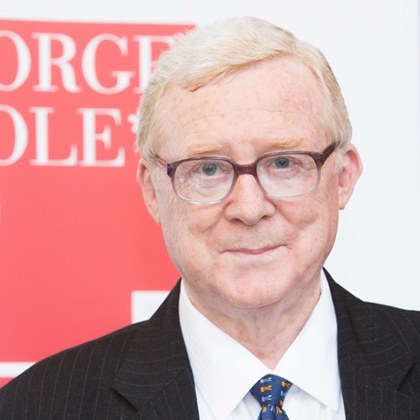 |
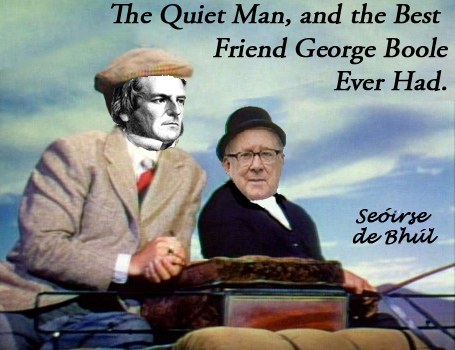 |
Professor Des MacHale hales from Castlebar, in Mayo. He completed his BSc and MSc in Galway, where his classmates included other future academics Pat Muldowney (Magee College) and Pat O'Leary (Kevin St & UCG), before doing his PhD on “Finite groups with automorphisms inverting many elements” at Keele, with Hans Liebeck. Since 1972 he’s been on the staff at UCC, working mostly in group and ring theory, a particular favorite topic being Boolean rings and generalisations. He has supervised numerous postgraduate dissertations, including 5 at the PhD level. Over the decades, he has done countless interviews for radio, TV, and print media, and given scores of talks in Ireland and abroad, promoting mathematics and rational thinking.
Des is the world’s leading expert on George Boole, Cork’s first professor of mathematics. On George Boole Day, 2 November 2015, to recognise the bicentennial of Boole’s birth, he was awarded an honorary doctorate of literature by UCC in recognition of his contributions to Boole scholarship. Along with former student Yvonne Cohen, he is currently working on another book, New Light on George Boole.
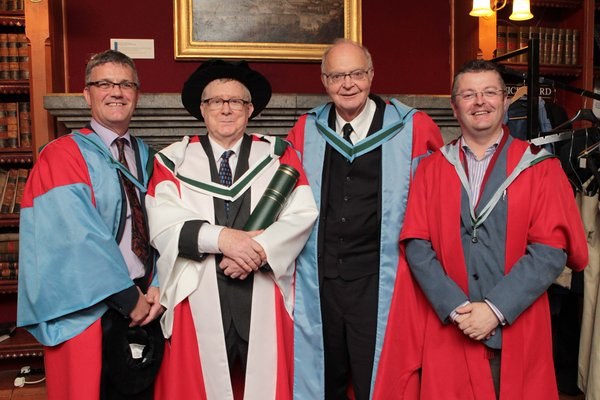
CAPTION: Des MacHale with fellow UCC honorary degree recipient Don Knuth, 2 November 2015.
A year later, on 8 October 2016, he was the recipient of the inaugural Maths Week Ireland award for Raising Public Awareness of Mathematics. He was presented with a hand-wrought patinated bronze sculpture of a Mobius Strip, created by Irish silversmith Seamus Gill.
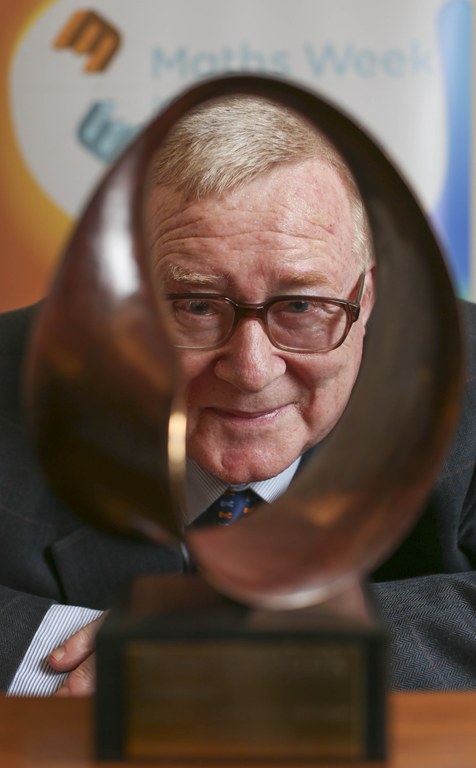
Taoiseach Enda Kenny’s congratulatory message noted, “I would like to congratulate Des on this richly deserved award. Indeed I recall him very well as a brilliant Leaving Certificate student all those years ago in St Gerald’s De La Salle College in Castlebar when I attended there as a young first year student. He has been a role model for many in the years since.”
Des has many passions apart from his students, teaching and research. These include brainteasers, lateral thinking puzzles, humour, and the 1952 film The Quiet Man, and he is the author of over 50 books on these topics. He designed the logo of the Irish Mathematical Society, in 1982, and earned a Diploma in Geology from UCC in 1996. He has also been known to sing a few verses of The Bould Geogie Boole.
The Bould Georgie Boole (short version)
We caught up with Des in the last week of November 2016, and put some questions to him.
1. When did you first get serious about researching Boole, and why?
It was 1974. Dr. Sean Pettit of UCC (whose funeral mass I attended this week) was doing his doctoral thesis on QCC and UCC and told me he had discovered some letters of Boole's in the Archives. I started to write a short article, which grew into a long article, which grew into a short book, which grew into a long book. Now with Yvonne Cohen, I am about to finish a second even longer book “New Light on George Boole”.
2. How do think the Boole200 celebrations went? What were the highlights for you?
Boole 200 was a superb event where all of UCC and the people of Cork pulled together to celebrate George Boole. There were many highlights--six conferences running simultaneously with Boolean themes, the republication of my book, the United Nations Declaration, the Google doodle, the honorary degrees to celebrities including the great Donald Knuth, the Boole documentary film on TV, Boole to School, and the great website. The “Bould Georgie Boole song” will be remembered long after the music and songs of Mozart and Beethoven are forgotten—but not until then!
CAPTION: The Bould Georgie Boole (long version)
3. How do you think research opportunities in Ireland for maths students have changed in your lifetime?
Research opportunities in the mathematical sciences in Ireland are now much better than when I was a student; some money is now available and people have to go abroad only if they want to. However, pure mathematics is still the poor relation and funders want instant practical results--Boole or Babbage would still find it difficult to get funding and support under the present system!
4. If you were starting out today, would you do anything differently?
I really have been very lucky in the topics I chose and the people I collaborated with--over thirty of them. I don't think there is a lot I would change. Maybe I should have learned more computing but if you choose your co-workers carefully, you don't have to!
5. How have UCC students changed over the decades?
UCC students are pretty good at mathematics--I have had at least half a dozen who were world class. But there has been a trend to rely on tables and machines too much--I prefer to carry as much as I can in my head. Many too have been seduced by the money in Applied Mathematics, Statistics and Financial Mathematics. For me Pure Mathematics is priceless and the top of the tree.
6. How have UCC staff changed over the decades?
UCC staff have been terrific over the years--Paddy Barry was a great Head of Department for forty years, had high standards, and treated his lecturers with great respect. We now have a lot of geometers, with complex analysis and algebra taking a back seat. But we have a terrific line up of active retired staff--Finbarr Holland, Brian Twomey, Donal Hurley, Paddy Barry, Pat Fitzpatrick, Martin Stynes, and Tony Seda.
7. Many people say there are connections between appreciation of (or ability in) maths and music. You see connections between maths and humour. what are the similarities between a good joke and a good theorem? Can either craft help the other?
Worth a whole book--see my Comic Sections: The Book of Mathematical Jokes, Humour, Wit and Wisdom!

There is a good parallel between a joke and a theorem:
Scenario <--> hypothesis
development of plot <--> proof
punchline <--> result
It has been shown that a strong sense of humour and mathematical ability go hand in hand--good students tend to be humorous. Humour requires insight, ingenuity, and the ability to 'see' things, as does mathematics.
8. What do you see as the role of brainteasers or puzzles in developing maths skills?
Problem solving is central to mathematics--puzzles, teasers, riddles are a great way into the subject, via the pleasure people get from getting the answer. Disguise is important because many are intimidated by mathematics possibly because of poor teaching. But bridge, chess, sudoku, and many other activities are just forms of mathematics!
9. Tell us about your design of the logo for the IMS.
There was a competition in the Bulletin of the IMS to design a logo and I was looking for something visual connected with Ireland. Since I was teaching Group Theory, the group graph of Hamilton's Quaternion group suggested itself and the rest is history.
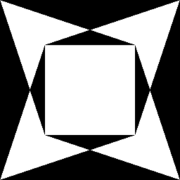
In 1982, Des MacHale designed the Irish Mathematical Society logo.
10. What question do you wish we'd asked?
“What has mathematics meant to me?” Almost everything! Certainty in a doubting world, mental stability, close contact with the most sublime beauty, and actually belief in God, because it fits so well together that it cannot be just random. As has been said, God exists because mathematics is consistent, but the Devil exists because we cannot prove it!
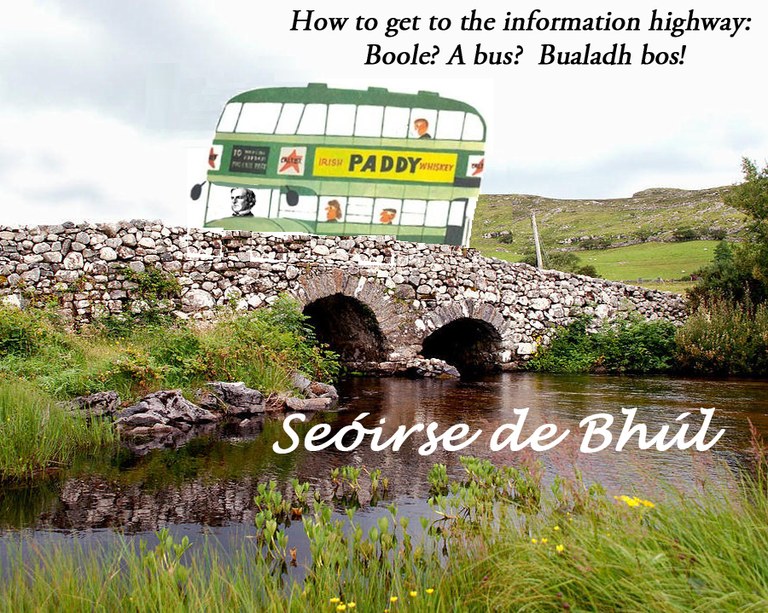
CAPTION: Boole is credited with laying the groundwork for the digital age, and this image shows him driving a bus over the bridge near Oughterard which is featured in The Quiet Man film. (Based on an idea of Eugene Gath's.)
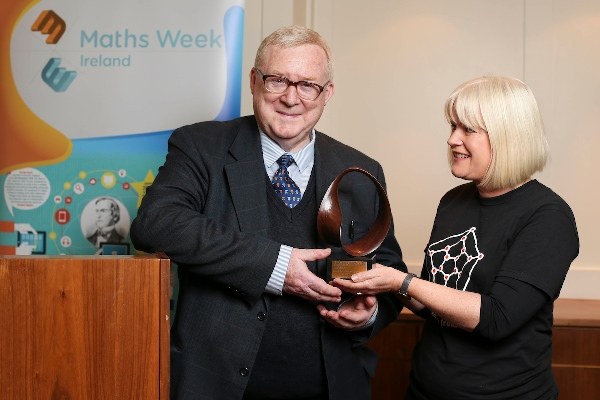
CAPTION: Des MacHale receives the inaugural Award for Raising Public Awareness of Maths from Sheila Donegan of Maths Week Ireland